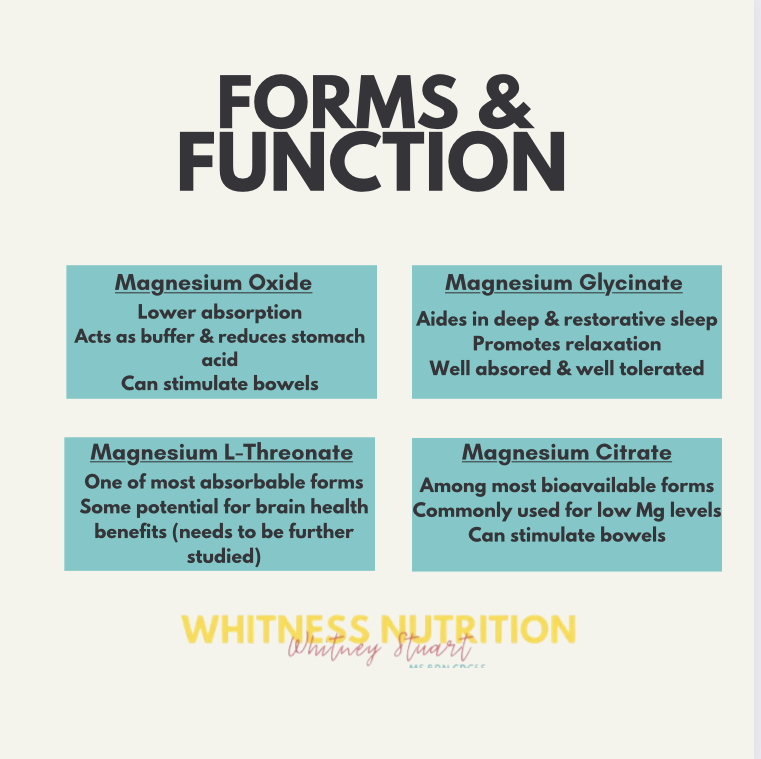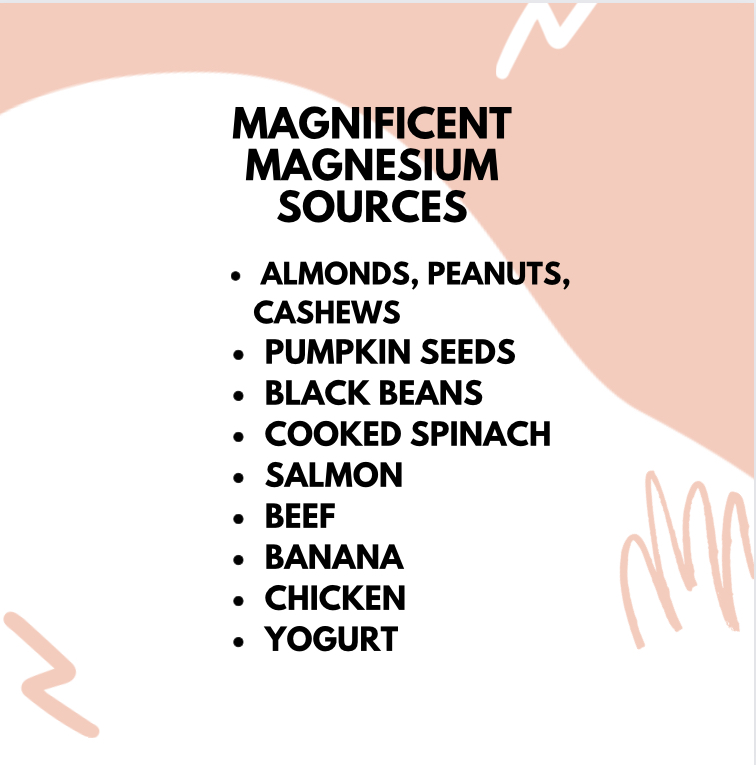As with all social media platforms, certain fads, hacks, diets and trends circulate and become mainstream. This is especially true when it comes to health. How many things have you seen on the internet that claim to “help you lose 10 pounds in 5 days” or “eliminate muscle soreness with this hack!”? Perhaps you’ve even gone down the rabbit hole of online claims only to find them completely false. One I recently came across intrigued me – the benefits of magnesium supplementation. The claims are appealing; better skin, mood stabilization, and improved digestive health. So, you’re wondering, are those things actually true?
In true Whitney fashion…I’m breaking down the research for you like I do for my patients!
First…let’s talk about what role magnesium plays in the body!
Magnesium has a hand in several functions throughout our body. It aids in building proteins and strong bones; regulates blood sugar, blood pressure; and contributes to muscle and nerve function. It does a lot of important things!
Well…how much magnesium do I need?
The recommended dietary intake of magnesium varies across males and females, as well as age. Be sure you talk with your healthcare provider regarding specifics for you and your circumstances.
Generally, though, it’s recommended for women to have 310-320 mg daily – pregnancy would increase this! For men, it’s recommended to have 400-420 mg daily. You can easily meet your magnesium needs by consuming rich sources like bananas, spinach, and even beef. Keep reading for more examples!
What symptoms could I have if my magnesium levels are low?
Because magnesium affects many processes in the body, there are several symptoms you could have that would indicate low magnesium levels.
- Fatigue
- Weakness
- Nausea, vomiting
- Numbness or tingling in skin
- Muscles cramps
Even more serious side effects such as seizures and irregular heart rhythms can occur.
It’s clearly a critical micronutrient in our diet!
Foods rich in Magnesium?
- 1 banana contains 32 mg
- 1 cup of spinach contains 24 mg
- 3 oz of beef contains 18 mg
- 1 cup of almonds contains a whopping 247 mg!
Thankfully, there are tons of delicious – and easily accessible – foods that are great sources of magnesium. Things like legumes, dark leafy greens, nuts, seeds, whole grains, fish, poultry and beef. Save this list of Whitness Nutrition Faves for getting in your magnesium!
Let’s get to what you really want to know; does magnesium supplementation ACTUALLY do what TikTok says it does?!
While I couldn’t find evidence-based reasoning on the TikTok claims of better skin – I want to share what role magnesium plays for most of my patients and how I implement it for health improvements.
6 Evidence-Based Recommendations for Use
Depression and Anxiety
Research shows magnesium chloride supplementation can improve overall depression and anxiety symptoms. As treatment for both anxiety and depression aren’t always accessible for everyone, it’s great to know that an over the counter supplement can have an impact on mood!
Regularity
Having trouble going number two? Then I’ve got good news for you! A study found that magnesium oxide, when combined with senna (a medication used to treat constipation), resulted in greater spontaneous bowel movements than those who were in the placebo group. Magnesium for movement!
Blood Pressure
Several studies identify the beneficial effects magnesium has on blood pressure. “Magnesium supplementation appears to achieve a small but clinically significant reduction in BP”. While dietary and lifestyle changes will make the biggest impact on overall heart health, it’s good to know that additional magnesium supplementation can help lower blood pressure. This helps to decrease stress on one of the most important organs in our bodies – the heart!
Blood Sugar
For patients with Type 2 diabetes or insulin resistance, magnesium has been shown to reduce plasma glucose levels, as well as increasing HDL (the good cholesterol!) in patients with Type 2 diabetes. Furthermore, insulin sensitivity can be improved by magnesium supplementation. The results are immediate; plasma glucose levels were improved after a 2-hour blood sugar check!
Sleep
The research on magnesium for sleep is not as strong, and I tend to avoid it for sleep hygiene improvements. After reviewing the studies; the overall results were mixed.
PCOS
A study of females with PCOS found that the women who had the highest levels of serum magnesium showed lower fasting glucose levels, lower testosterone, and improved insulin sensitivity. Magnesium supplementation could have a direct impact on the symptoms and insulin resistance prevalent in PCOS.
What form is best for me?
So far, we’ve reviewed what magnesium does in the body, how much you need, what foods you can find it in, and evidence-based reasons why we need the proper amount of magnesium in our bodies. But…what about the different types of magnesium?
Note: Not every form of magnesium is the same!

There are so many forms of magnesium! Check out the other forms, here to see what they are, and they’re best used for!
TikTok may have gotten this one right…while there were no evidence-based claims backing better skin with magnesium supplementation, there are still many good reasons to ensure you’re getting enough magnesium in your diet! It plays a major role in your musculoskeletal system, the (literal) beating of your heart, and other muscle and nerve functions.
So, are you not sure if you’re getting enough magnesium in your diet, or are curious about supplementation? Book a call with me to start your journey to adequate nutrition and curated supplement recommendations. Make sure you check out my blog for recipes and #WWWO recommendations; all of which have a focus on getting micronutrients like magnesium into your diet.



